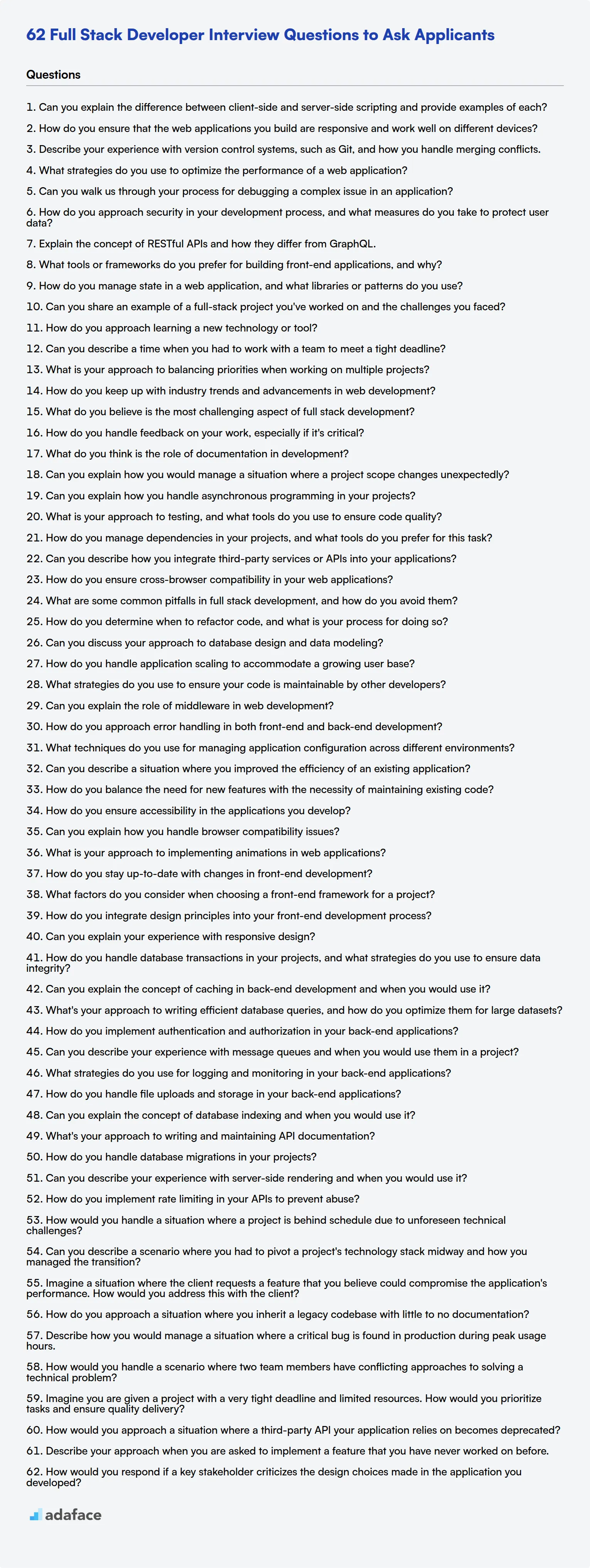When hiring a Full Stack Developer, asking the right questions is key to identifying whether a candidate's skills match your project needs. By focusing on relevant skills required for full stack developers, you can ensure a good fit for your team.
This blog post provides a selection of interview questions tailored to assess Full Stack Developer candidates at different experience levels. From questions targeting junior developers to those aimed at evaluating top-tier applicants, we aim to cover a spectrum of inquiries for comprehensive assessment.
By using this guide for your interviews, you can better gauge an applicant's technical abilities and development approach. For a more thorough evaluation, consider starting with our Full Stack Developer test before conducting interviews.
Table of contents
10 common Full Stack Developer interview questions to ask your applicants
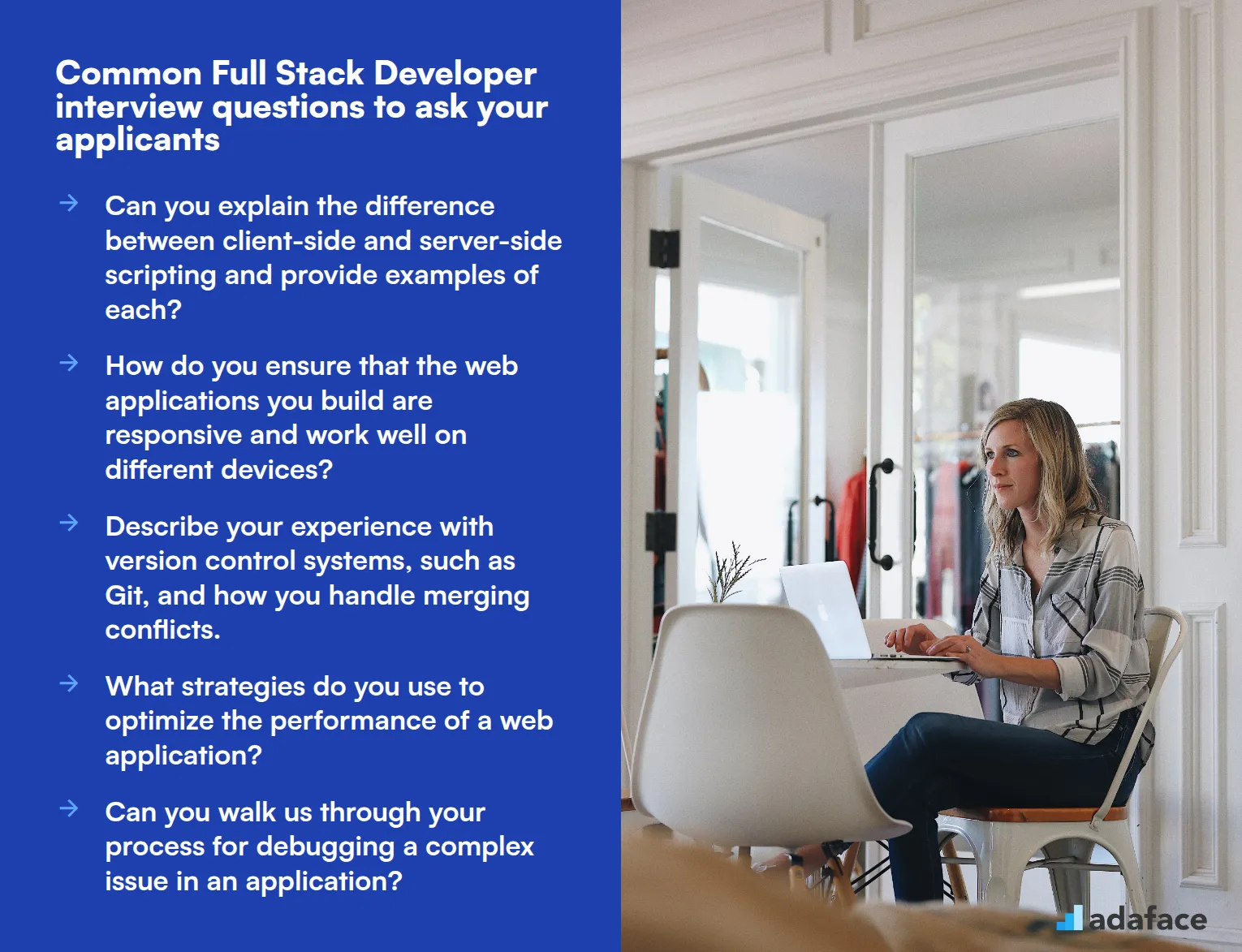
When interviewing candidates for a Full Stack Developer position, it's crucial to ask the right questions to gauge their technical skills and practical experience. Use these common interview questions to assess whether your applicants have the comprehensive knowledge necessary for the role and how they can contribute to your team's success. For more insights, check out our guide on Full Stack Developer job descriptions.
- Can you explain the difference between client-side and server-side scripting and provide examples of each?
- How do you ensure that the web applications you build are responsive and work well on different devices?
- Describe your experience with version control systems, such as Git, and how you handle merging conflicts.
- What strategies do you use to optimize the performance of a web application?
- Can you walk us through your process for debugging a complex issue in an application?
- How do you approach security in your development process, and what measures do you take to protect user data?
- Explain the concept of RESTful APIs and how they differ from GraphQL.
- What tools or frameworks do you prefer for building front-end applications, and why?
- How do you manage state in a web application, and what libraries or patterns do you use?
- Can you share an example of a full-stack project you've worked on and the challenges you faced?
8 Full Stack Developer interview questions and answers to evaluate junior developers
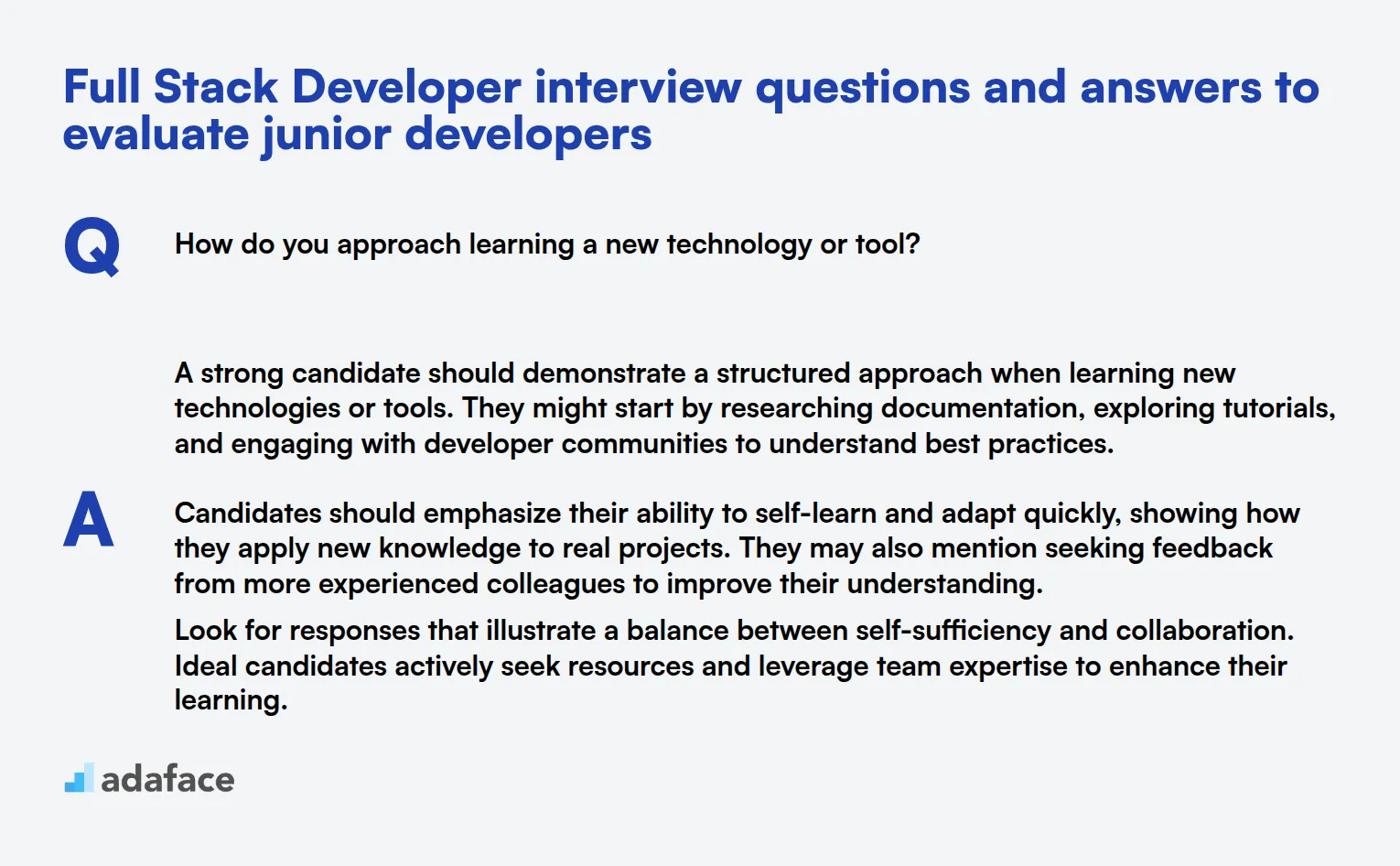
To ensure you hire a junior full stack developer who can seamlessly navigate through both front-end and back-end challenges, use these interview questions. They are designed to reveal not just technical skills, but also problem-solving abilities, adaptability, and the potential to grow into a seasoned developer.
1. How do you approach learning a new technology or tool?
A strong candidate should demonstrate a structured approach when learning new technologies or tools. They might start by researching documentation, exploring tutorials, and engaging with developer communities to understand best practices.
Candidates should emphasize their ability to self-learn and adapt quickly, showing how they apply new knowledge to real projects. They may also mention seeking feedback from more experienced colleagues to improve their understanding.
Look for responses that illustrate a balance between self-sufficiency and collaboration. Ideal candidates actively seek resources and leverage team expertise to enhance their learning.
2. Can you describe a time when you had to work with a team to meet a tight deadline?
Collaborating effectively under pressure is essential in development. A candidate might describe how they broke the project into manageable tasks, assigned roles based on team strengths, and used tools to track progress and ensure everyone stayed aligned.
They should mention any challenges faced, like unforeseen bugs or resource limitations, and how they communicated with the team to overcome these obstacles. This demonstrates their ability to remain calm and focused.
Assess whether the candidate values clear communication and teamwork. An ideal response would highlight their role in facilitating collaboration and how they contributed to the successful completion of the project.
3. What is your approach to balancing priorities when working on multiple projects?
Managing multiple projects requires strong organizational skills. Candidates may describe their method of using task management tools to prioritize tasks based on deadlines and project impact.
They should discuss how they communicate with stakeholders to set realistic expectations and make necessary adjustments to project timelines or resources.
Look for candidates who demonstrate an ability to multitask effectively without compromising on quality. Their approach should reflect a proactive attitude towards addressing potential conflicts in project scheduling.
4. How do you keep up with industry trends and advancements in web development?
A proactive developer stays updated by following technology blogs, attending webinars, and participating in online forums. Candidates might mention specific resources or platforms they use regularly.
Developers should also engage in continuous learning through courses or certifications to sharpen their skills in full stack development.
Consider candidates who show a genuine enthusiasm for learning. Their commitment to staying current with industry trends is key to enhancing their development skills and contributing fresh ideas.
5. What do you believe is the most challenging aspect of full stack development?
Responses might include balancing the demands of both front-end and back-end development, managing ever-changing technologies, or ensuring seamless integration and performance.
A candidate could mention the importance of understanding the big picture while paying attention to detail in both user interface design and server-side logic.
Look for answers that demonstrate insight into the complexities of full stack development. Ideal candidates should express a readiness to tackle these challenges and a desire to develop versatile skills.
6. How do you handle feedback on your work, especially if it's critical?
Candidates should embrace feedback as an opportunity for growth. They might describe how they actively listen, ask clarifying questions, and reflect on the criticism to improve their work.
They should illustrate their willingness to engage in constructive discussions and collaborate with peers to enhance project outcomes.
Seek candidates who exhibit openness and resilience. Their ability to handle feedback positively is essential for personal development and maintaining a collaborative team environment.
7. What do you think is the role of documentation in development?
Documentation is crucial for maintaining clarity and ensuring that future developers can understand and build upon existing code. Candidates should appreciate its role in reducing onboarding time for new team members.
They may discuss best practices for creating comprehensive and accessible documentation, emphasizing the importance of keeping it up to date.
An ideal candidate values documentation as a tool for effective collaboration and knowledge sharing. Their approach should reflect an understanding of its long-term benefits for project success.
8. Can you explain how you would manage a situation where a project scope changes unexpectedly?
Adapting to changing project scopes involves reassessing priorities and resources. Candidates might discuss how they maintain open communication with stakeholders to understand new requirements and adjust timelines.
They should also emphasize their ability to manage stress and ensure team alignment despite shifting goals.
Look for candidates who demonstrate flexibility and problem-solving skills. Their ability to pivot and strategize under changing circumstances is crucial for successful project delivery.
15 intermediate Full Stack Developer interview questions and answers to ask mid-tier developers.
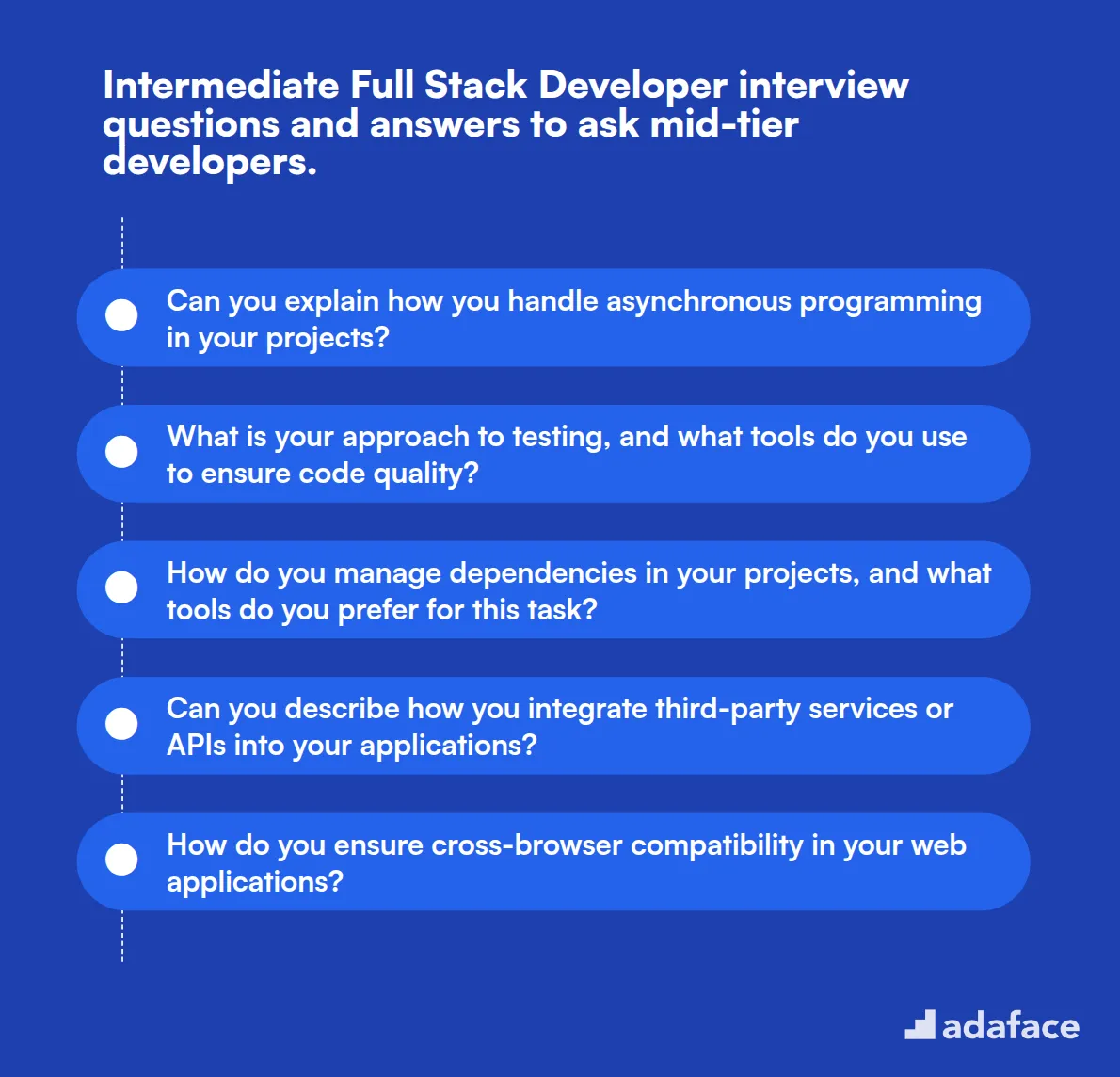
To identify if candidates have the right mix of technical and problem-solving skills, use these intermediate full stack developer interview questions. They're designed to challenge mid-tier developers and gauge their ability to handle complex tasks. For a deeper dive into what makes a great developer, explore our full stack developer job description.
- Can you explain how you handle asynchronous programming in your projects?
- What is your approach to testing, and what tools do you use to ensure code quality?
- How do you manage dependencies in your projects, and what tools do you prefer for this task?
- Can you describe how you integrate third-party services or APIs into your applications?
- How do you ensure cross-browser compatibility in your web applications?
- What are some common pitfalls in full stack development, and how do you avoid them?
- How do you determine when to refactor code, and what is your process for doing so?
- Can you discuss your approach to database design and data modeling?
- How do you handle application scaling to accommodate a growing user base?
- What strategies do you use to ensure your code is maintainable by other developers?
- Can you explain the role of middleware in web development?
- How do you approach error handling in both front-end and back-end development?
- What techniques do you use for managing application configuration across different environments?
- Can you describe a situation where you improved the efficiency of an existing application?
- How do you balance the need for new features with the necessity of maintaining existing code?
7 Full Stack Developer interview questions and answers related to front-end technologies
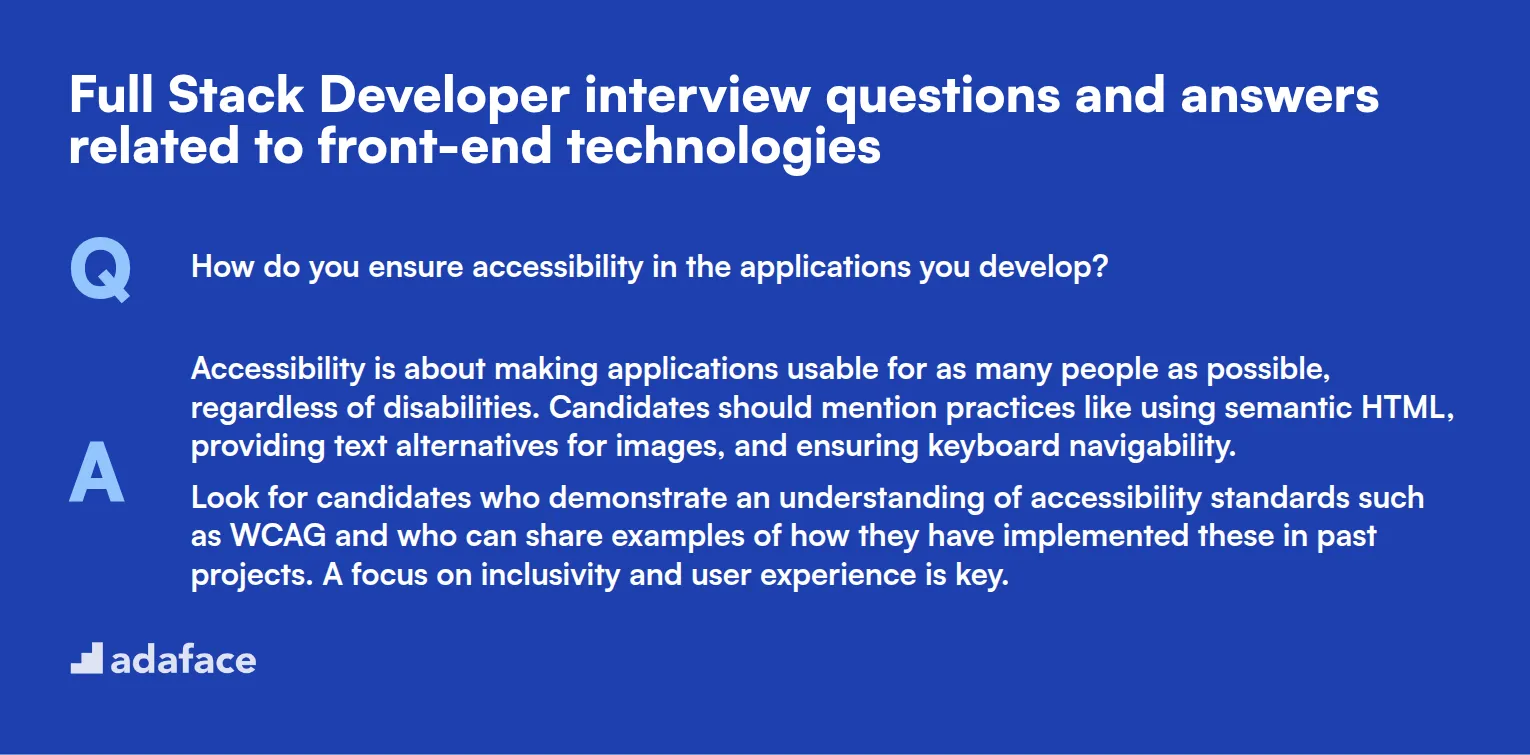
Looking to uncover the front-end brilliance in your potential full stack developer? This collection of interview questions is designed to help you assess their expertise with the user-facing side of web development. Use these questions to get insights into candidates' abilities to craft visually appealing and interactive interfaces.
1. How do you ensure accessibility in the applications you develop?
Accessibility is about making applications usable for as many people as possible, regardless of disabilities. Candidates should mention practices like using semantic HTML, providing text alternatives for images, and ensuring keyboard navigability.
Look for candidates who demonstrate an understanding of accessibility standards such as WCAG and who can share examples of how they have implemented these in past projects. A focus on inclusivity and user experience is key.
2. Can you explain how you handle browser compatibility issues?
Handling browser compatibility involves ensuring that a website looks and functions the same across different browsers. Candidates might mention using CSS resets, vendor prefixes, and testing on multiple browsers as part of their strategy.
A strong candidate response should reflect an ability to identify common issues and proactively address them. Experience with tools like BrowserStack for testing can be an added advantage.
3. What is your approach to implementing animations in web applications?
Animations can enhance user engagement when used appropriately. Candidates might discuss using CSS for simple transitions and animations, and JavaScript libraries for more complex interactions.
Look for candidates who balance creativity with performance, ensuring animations don’t hinder site speed. Understanding the impact of animations on user experience is crucial.
4. How do you stay up-to-date with changes in front-end development?
Staying current is vital in the rapidly evolving tech world. Candidates might subscribe to industry newsletters, follow influential developers on social media, or participate in online communities and forums.
An ideal candidate should demonstrate proactive learning habits and an enthusiasm for continuous improvement. Mention of specific resources like blogs or conferences can indicate a genuine interest.
5. What factors do you consider when choosing a front-end framework for a project?
Choosing a framework involves considering factors like project requirements, scalability, community support, and performance. Candidates should be able to articulate why they might choose React, Angular, or Vue, for instance.
Look for thoughtful analysis in their response, indicating an understanding of the trade-offs involved in such decisions. Experience with multiple frameworks can also be a plus.
6. How do you integrate design principles into your front-end development process?
Integrating design principles is about ensuring the visual appeal and usability of web applications. Candidates may discuss collaborating with designers, using design systems, and adhering to principles like contrast, alignment, and consistency.
Strong candidates will show an ability to translate design into code seamlessly, ensuring the end product is both functional and aesthetically pleasing. Experience working with design tools can be advantageous.
7. Can you explain your experience with responsive design?
Responsive design is crucial for ensuring web applications work well on various devices. Candidates should mention techniques like media queries, flexible grids, and fluid layouts as part of their approach.
Listen for specifics about past projects and how they tackled challenges in responsiveness. Familiarity with frameworks like Bootstrap can be beneficial as well.
12 Full Stack Developer interview questions about back-end processes
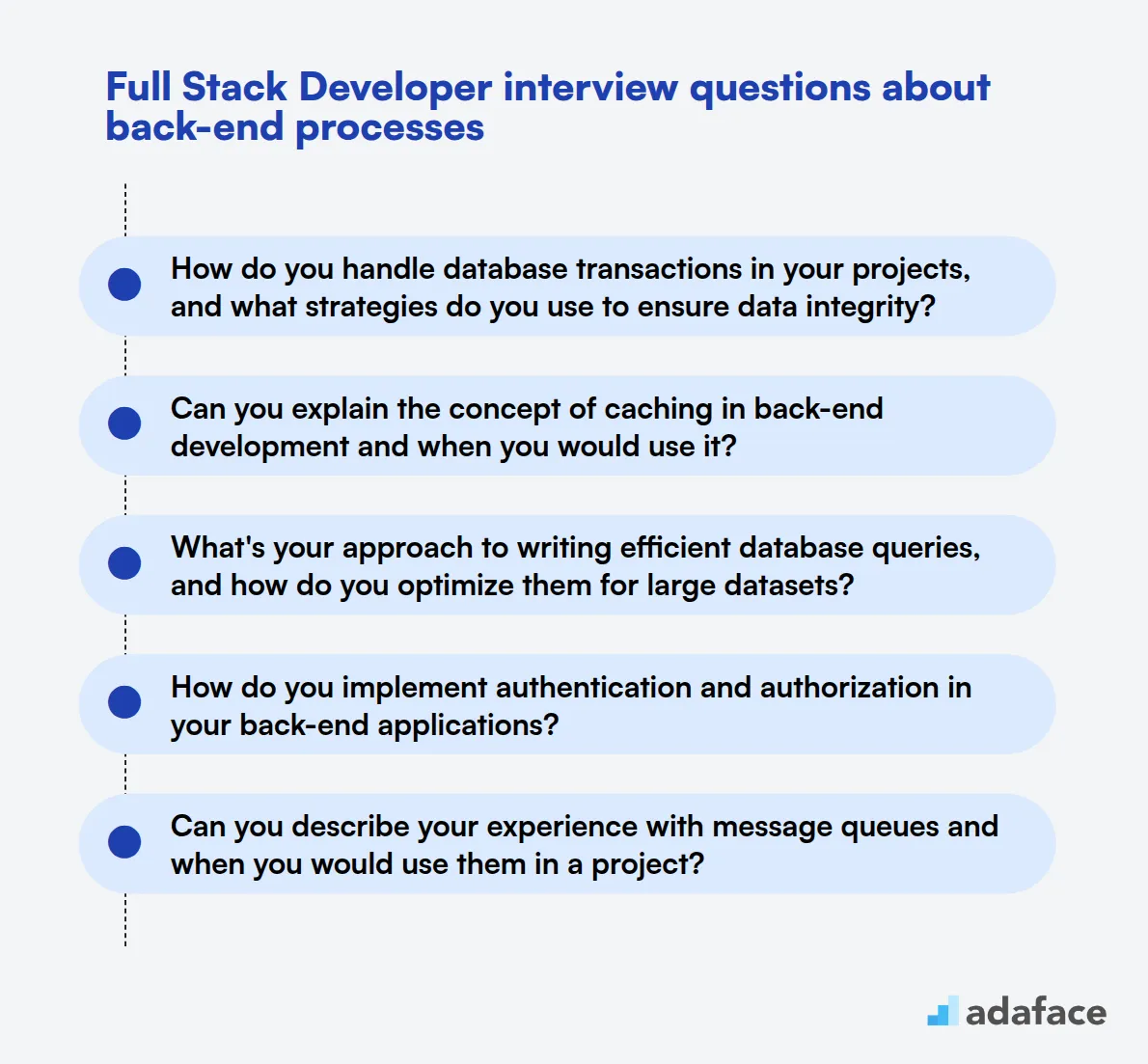
To assess a candidate's proficiency in back-end processes, use these 12 Full Stack Developer interview questions. These questions will help you evaluate the applicant's understanding of server-side operations, database management, and API development, which are crucial for building robust web applications.
- How do you handle database transactions in your projects, and what strategies do you use to ensure data integrity?
- Can you explain the concept of caching in back-end development and when you would use it?
- What's your approach to writing efficient database queries, and how do you optimize them for large datasets?
- How do you implement authentication and authorization in your back-end applications?
- Can you describe your experience with message queues and when you would use them in a project?
- What strategies do you use for logging and monitoring in your back-end applications?
- How do you handle file uploads and storage in your back-end applications?
- Can you explain the concept of database indexing and when you would use it?
- What's your approach to writing and maintaining API documentation?
- How do you handle database migrations in your projects?
- Can you describe your experience with server-side rendering and when you would use it?
- How do you implement rate limiting in your APIs to prevent abuse?
10 situational Full Stack Developer interview questions for hiring top developers
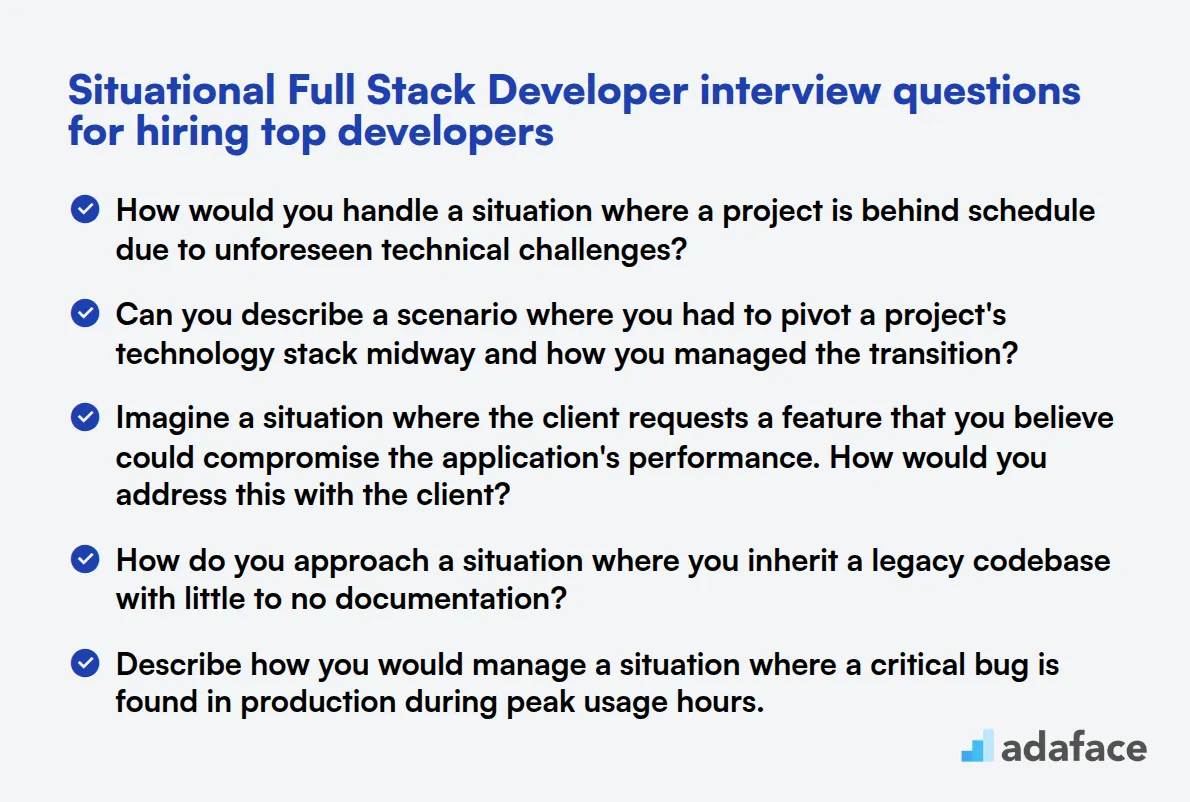
To identify top developers who can handle real-world scenarios and challenges, consider asking them some situational full stack developer interview questions. These questions help you assess a candidate's problem-solving skills and adaptability. For more insights on what makes a great full stack developer, explore our detailed job description.
- How would you handle a situation where a project is behind schedule due to unforeseen technical challenges?
- Can you describe a scenario where you had to pivot a project's technology stack midway and how you managed the transition?
- Imagine a situation where the client requests a feature that you believe could compromise the application's performance. How would you address this with the client?
- How do you approach a situation where you inherit a legacy codebase with little to no documentation?
- Describe how you would manage a situation where a critical bug is found in production during peak usage hours.
- How would you handle a scenario where two team members have conflicting approaches to solving a technical problem?
- Imagine you are given a project with a very tight deadline and limited resources. How would you prioritize tasks and ensure quality delivery?
- How would you approach a situation where a third-party API your application relies on becomes deprecated?
- Describe your approach when you are asked to implement a feature that you have never worked on before.
- How would you respond if a key stakeholder criticizes the design choices made in the application you developed?
Which Full Stack Developer skills should you evaluate during the interview phase?
Assessing a candidate's abilities in a single interview can be challenging. However, focusing on key skills for a Full Stack Developer is essential to ensure you select the right fit for your team. These core skills are indispensable in evaluating a candidate's potential for success in this multifaceted role.
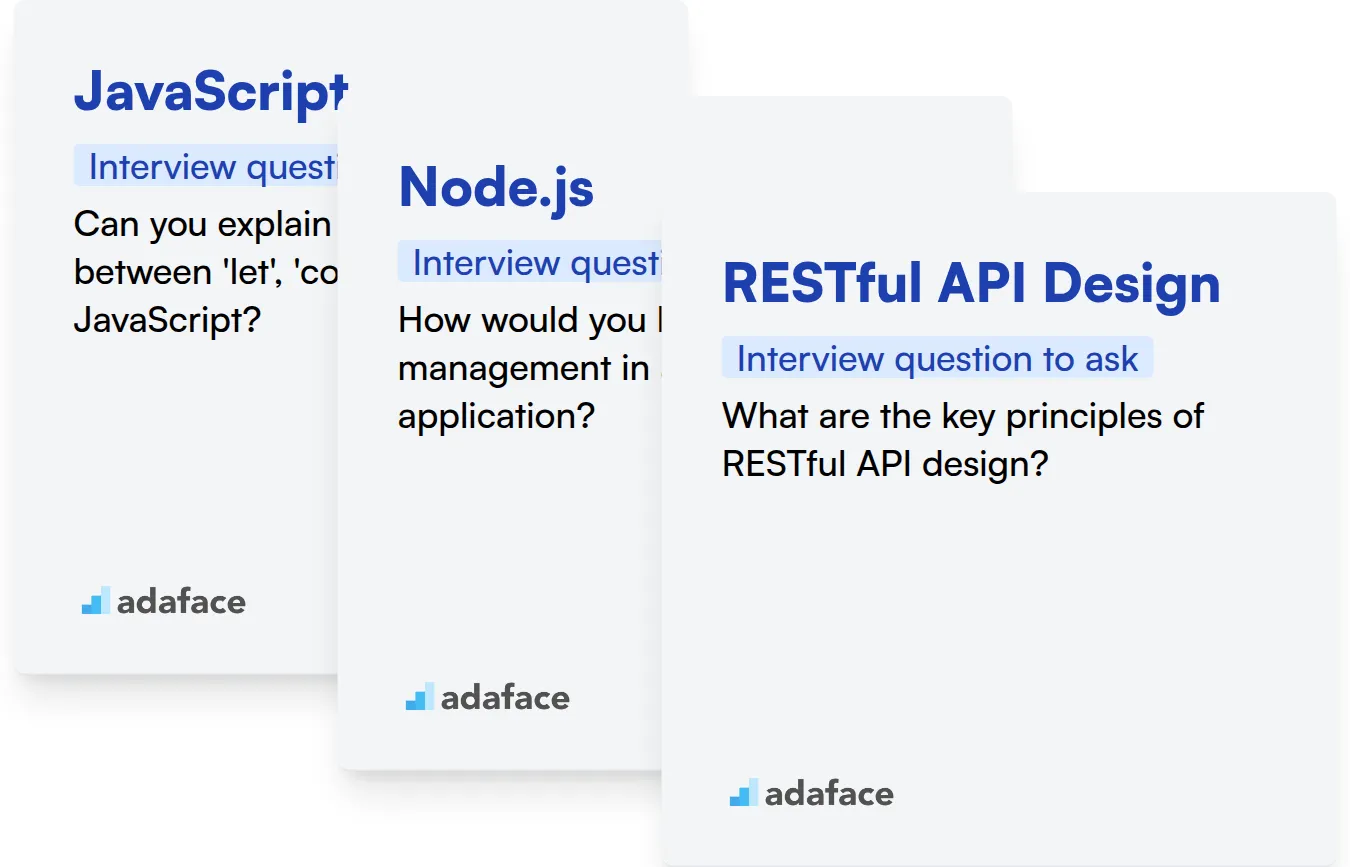
JavaScript
To filter candidates on their JavaScript skills, consider using an assessment test, such as the JavaScript online test. This can help you determine their proficiency level before diving deeper into an interview.
In addition to assessments, you can ask targeted questions to further gauge their JavaScript expertise.
Can you explain the difference between 'let', 'const', and 'var' in JavaScript?
Look for a clear understanding of scope and the implications of using each type of declaration. Candidates should be able to discuss how 'let' and 'const' provide block scoping, while 'var' provides function scope, showcasing their knowledge of modern JavaScript best practices.
Node.js
You might want to utilize a Node.js assessment test to gauge candidates' proficiency. The Node.js online test could serve as a valuable tool in your hiring process.
To further assess a candidate's Node.js skills, consider asking specific questions during the interview.
How would you handle error management in a Node.js application?
Candidates should demonstrate an understanding of error handling practices in Node.js, such as using try-catch blocks, handling asynchronous errors, and possibly utilizing middleware for centralized error handling.
RESTful API Design
To evaluate candidates on this skill, consider an assessment test focused on API design principles if available. This will help you filter candidates effectively.
You can also ask targeted interview questions to further explore their knowledge in this area.
What are the key principles of RESTful API design?
Look for responses that encompass the use of stateless interactions, resource-based URLs, proper HTTP methods, and clear response codes, indicating a solid grasp of API design fundamentals.
Hire Top Full Stack Developers with Adaface Skills Tests and Interview Questions
If you're aiming to hire a Full Stack Developer, it's important to ensure that they possess the right skills for the role. This can be a challenging task, but making the right choice is critical for your team's success.
One of the most effective ways to verify these skills is by using targeted skill tests. Consider utilizing our Full Stack Developer Test or the JavaScript Node SQL Test to assess your candidates.
After employing these assessments, you can create a shortlist of the best candidates for interviews. This process helps streamline your hiring and ensures that you're considering only the most qualified applicants.
To get started, visit our online assessment platform or go directly to the sign-up page to begin evaluating your candidates.
TypeScript Online Test
Download Full Stack Developer interview questions template in multiple formats
Full Stack Developer Interview Questions FAQs
Key skills include proficiency in both front-end and back-end programming, understanding of databases, and knowledge of DevOps practices.
Ask questions about HTML, CSS, JavaScript, and modern front-end frameworks like React or Angular.
Candidates should be familiar with server-side languages such as Node.js, Python, Ruby, as well as databases like SQL and NoSQL.
Situational questions help assess a candidate's problem-solving abilities and how they handle real-world challenges.
Testing ensures that the application functions as expected and helps identify bugs or issues early in the development process.
Focus on fundamental skills, eagerness to learn, and problem-solving capabilities rather than extensive experience.

40 min skill tests.
No trick questions.
Accurate shortlisting.
We make it easy for you to find the best candidates in your pipeline with a 40 min skills test.
Try for freeRelated posts
Free resources




